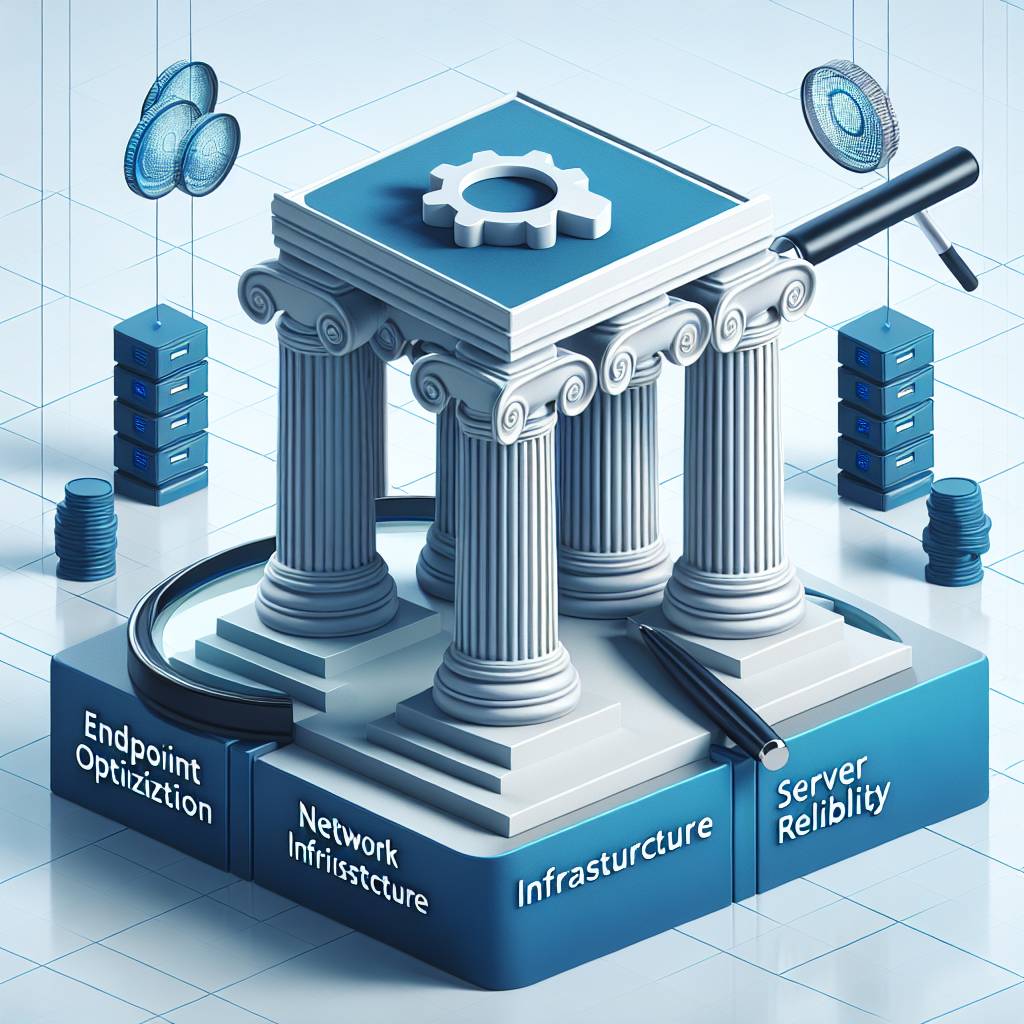Your cart is currently empty!
Tag: Data Center Audits

How to Conduct a Successful Data Center Audit: Best Practices and Strategies
In today’s digital age, data centers play a crucial role in storing and managing vast amounts of information for businesses. With the increasing importance of data security and compliance, conducting regular audits of data centers has become essential. A successful data center audit can help ensure that the facility is operating efficiently, securely, and in compliance with regulations. In this article, we will discuss the best practices and strategies for conducting a successful data center audit.1. Define the scope and objectives of the audit: Before conducting a data center audit, it is important to clearly define the scope and objectives of the audit. This will help focus the audit on specific areas of concern and ensure that all relevant aspects of the data center are thoroughly examined.
2. Review documentation and policies: Start the audit by reviewing the documentation and policies related to the data center, including security policies, access controls, disaster recovery plans, and compliance documentation. This will provide a foundation for understanding the operational practices and procedures in place at the data center.
3. Assess physical security measures: Physical security is a critical aspect of data center operations. During the audit, assess the physical security measures in place, such as access controls, surveillance systems, and environmental controls. Ensure that these measures are robust enough to protect the data center from unauthorized access and potential threats.
4. Evaluate data center infrastructure: Evaluate the infrastructure of the data center, including power supply, cooling systems, and network connectivity. Check for any vulnerabilities or points of failure that could impact the availability and reliability of the data center operations.
5. Conduct a risk assessment: Identify potential risks and vulnerabilities in the data center environment, such as power outages, equipment failures, and security breaches. Develop a risk assessment plan to address these risks and mitigate potential threats to the data center.
6. Perform security testing: Conduct security testing, such as penetration testing and vulnerability assessments, to identify any weaknesses in the data center’s security controls. This will help identify areas that need improvement and strengthen the overall security posture of the data center.
7. Review compliance requirements: Ensure that the data center is compliant with industry regulations and standards, such as PCI DSS, HIPAA, and GDPR. Review the compliance requirements and assess whether the data center meets the necessary standards to protect sensitive data and ensure data privacy.
8. Document findings and recommendations: Document all findings from the audit, including any vulnerabilities, risks, and areas for improvement. Provide recommendations for addressing these issues and strengthening the security and compliance posture of the data center.
In conclusion, conducting a successful data center audit requires careful planning, thorough assessment, and strategic recommendations for improving the security and compliance of the facility. By following these best practices and strategies, businesses can ensure that their data centers are operating efficiently, securely, and in compliance with regulations.

Using Data Center Audits to Drive Business Growth and Innovation
In today’s digital age, data centers play a crucial role in the success of businesses. They house the servers, storage systems, and networking equipment that support the IT infrastructure of companies, enabling them to store, manage, and process vast amounts of data. With the increasing reliance on data and technology, it has become essential for businesses to ensure that their data centers are operating efficiently and securely.One way that businesses can achieve this is through regular data center audits. An audit involves a comprehensive review of the data center’s infrastructure, systems, and processes to identify any potential issues or areas for improvement. By conducting audits on a regular basis, businesses can proactively address any issues before they escalate into major problems that could disrupt operations or compromise data security.
But data center audits are not just about ensuring compliance or mitigating risks. They can also be a powerful tool for driving business growth and innovation. By leveraging the insights and recommendations from audits, businesses can identify opportunities to optimize their data center operations, improve performance, and enhance the overall efficiency of their IT infrastructure.
For example, an audit may reveal that certain servers are underutilized or are consuming excessive energy. By consolidating or decommissioning these servers, businesses can reduce their operating costs and improve energy efficiency. This, in turn, can free up resources that can be reallocated to other areas of the business, such as investing in new technologies or expanding services.
Furthermore, data center audits can also help businesses identify opportunities for innovation. By evaluating the current state of their data center infrastructure and comparing it to industry best practices, businesses can pinpoint areas where they can adopt new technologies or implement new processes to stay ahead of the competition. For example, an audit may reveal that a business could benefit from implementing virtualization technology to improve scalability and flexibility.
In today’s fast-paced and competitive business environment, staying ahead of the curve is essential for driving growth and innovation. Data center audits provide businesses with the insights and recommendations they need to optimize their data center operations, improve performance, and drive business growth. By leveraging the findings from audits, businesses can make informed decisions that will enable them to stay competitive, reduce costs, and deliver innovative solutions to their customers. Ultimately, data center audits are not just a compliance requirement – they are a strategic tool for driving business success in the digital age.

Navigating Common Challenges in Data Center Audits
In today’s digital age, data centers play a crucial role in storing and managing vast amounts of information for businesses and organizations. However, ensuring the security and efficiency of these data centers requires regular audits to identify and address potential vulnerabilities. Navigating common challenges in data center audits is essential for ensuring that sensitive data is protected and operations run smoothly.One of the most common challenges in data center audits is ensuring compliance with industry regulations and standards. Data centers are subject to strict guidelines to protect sensitive information, such as the Health Insurance Portability and Accountability Act (HIPAA) and the Payment Card Industry Data Security Standard (PCI DSS). Auditors must ensure that the data center meets these requirements to avoid hefty fines and reputational damage.
Another challenge is assessing the physical security of the data center. Auditors must evaluate the facility’s access controls, surveillance systems, and environmental controls to ensure that only authorized personnel can access the data center and that the equipment is protected from physical threats such as theft, fire, and natural disasters.
Additionally, auditors must evaluate the data center’s network security to prevent data breaches and cyberattacks. This involves assessing the effectiveness of firewalls, intrusion detection systems, and encryption protocols to protect data in transit and at rest. Auditors must also ensure that regular security updates and patches are applied to all systems to mitigate the risk of vulnerabilities being exploited.
Furthermore, auditors must assess the data center’s disaster recovery and business continuity plans to ensure that data can be quickly restored in the event of a system failure or natural disaster. This involves testing backup systems, conducting regular drills, and documenting procedures for restoring data and operations in a timely manner.
Finally, auditors must evaluate the data center’s overall performance and efficiency to ensure that it can meet the demands of the organization. This involves assessing power and cooling systems, server utilization rates, and storage capacity to identify potential bottlenecks and inefficiencies that could impact performance.
In conclusion, navigating common challenges in data center audits is essential for ensuring the security, reliability, and efficiency of data center operations. By addressing compliance, physical security, network security, disaster recovery, and performance issues, auditors can help organizations protect their sensitive information and maintain business continuity in the face of potential threats. By staying vigilant and proactive in addressing these challenges, organizations can ensure that their data centers remain secure and reliable assets for their operations.

Ensuring Data Center Resilience with Comprehensive Audits
In today’s digital age, data centers play a crucial role in storing and managing vast amounts of information for businesses of all sizes. With the increasing reliance on data and the potential risks of cyber threats, ensuring the resilience and security of data centers has never been more important.One of the key ways to ensure the resilience of a data center is through comprehensive audits. These audits are vital in identifying vulnerabilities, weaknesses, and areas for improvement within the data center environment. By conducting regular audits, organizations can proactively address potential issues before they escalate into major problems.
There are several aspects that need to be considered when conducting a comprehensive audit of a data center. This includes assessing the physical security measures in place, such as access controls, surveillance systems, and environmental controls to protect against physical threats like theft, vandalism, or natural disasters.
Additionally, audits should also focus on the cybersecurity measures implemented within the data center, such as firewalls, encryption, intrusion detection systems, and regular vulnerability assessments to prevent cyber attacks and data breaches. It is essential to ensure that all software and hardware components are up-to-date and patched regularly to mitigate security risks.
Furthermore, audits should also evaluate the resilience of the data center’s infrastructure, including power and cooling systems, backup generators, and redundant network connections to ensure continuous operations in the event of a power outage or equipment failure.
By conducting regular audits, organizations can gain valuable insights into the overall health and security of their data center environment. This information can help identify areas for improvement, implement best practices, and ensure compliance with industry regulations and standards.
In conclusion, ensuring the resilience of a data center is critical for maintaining the integrity and availability of data. Comprehensive audits play a crucial role in identifying vulnerabilities and weaknesses within the data center environment, allowing organizations to proactively address potential risks and enhance security measures. By prioritizing data center audits, businesses can safeguard their data and minimize the impact of potential disruptions on their operations.

Top Considerations for Performing a Data Center Audit
In today’s digital age, data centers play a crucial role in the operation of businesses. They store and manage vast amounts of data, ensuring that it is secure, accessible, and reliable. However, as technology evolves and data centers grow in complexity, it becomes essential for businesses to regularly perform audits to ensure their data center is operating efficiently and effectively. Here are some top considerations for performing a data center audit:1. Security: One of the most critical aspects of a data center audit is ensuring that security measures are in place to protect sensitive data. This includes physical security, such as access controls and surveillance cameras, as well as cybersecurity measures like firewalls, encryption, and intrusion detection systems.
2. Compliance: Data centers must comply with various industry regulations and standards, such as GDPR, HIPAA, and PCI DSS. During an audit, it is crucial to ensure that all compliance requirements are being met to avoid potential legal and financial consequences.
3. Infrastructure: The physical infrastructure of a data center, including power supply, cooling systems, and networking equipment, must be regularly inspected to ensure it is functioning properly. Any issues or potential points of failure should be identified and addressed promptly.
4. Data backups and disaster recovery: Data backups are essential for ensuring that data can be restored in the event of a disaster or system failure. During an audit, it is important to verify that backups are being performed regularly and that disaster recovery plans are in place and tested regularly.
5. Capacity planning: As data centers grow and evolve, it is crucial to regularly assess capacity requirements to ensure that the data center can accommodate future growth. This includes evaluating power and cooling requirements, as well as storage and networking capacity.
6. Performance monitoring: Monitoring the performance of servers, storage devices, and networking equipment is essential for identifying bottlenecks and optimizing the efficiency of the data center. During an audit, performance metrics should be reviewed to identify any issues and make necessary adjustments.
7. Documentation: Keeping thorough documentation of all data center processes, procedures, and configurations is essential for ensuring the smooth operation of the data center. During an audit, it is important to review and update documentation to ensure it is accurate and up to date.
In conclusion, performing regular data center audits is essential for ensuring the security, compliance, and efficiency of a data center. By considering these top considerations during an audit, businesses can identify potential issues, address them promptly, and ensure the smooth operation of their data center.

How Data Center Audits Can Improve Security and Compliance
In today’s digital age, data centers play a crucial role in storing and managing vast amounts of information for businesses and organizations. With cyber threats on the rise, ensuring the security and compliance of data centers has become more important than ever. One way to achieve this is through regular audits.Data center audits are essential processes that help organizations assess the effectiveness of their security measures and ensure compliance with industry regulations and standards. These audits involve a thorough examination of the data center’s infrastructure, policies, procedures, and controls to identify vulnerabilities and areas for improvement.
By conducting regular audits, organizations can proactively identify and address security risks before they lead to a data breach or compliance violation. This not only helps protect sensitive information and maintain the trust of customers and stakeholders but also helps avoid costly fines and legal repercussions.
Audits can also help organizations stay up to date with the latest security best practices and compliance requirements. As cyber threats continue to evolve, it is essential for data centers to continuously assess and enhance their security measures to stay one step ahead of hackers and malicious actors.
Furthermore, data center audits can provide valuable insights into the overall efficiency and performance of the data center. By evaluating the effectiveness of existing processes and controls, organizations can identify opportunities for optimization and cost savings.
In addition to improving security and compliance, data center audits can also help organizations demonstrate their commitment to data protection and regulatory compliance to customers, partners, and regulators. By having a third-party auditor validate their security measures and practices, organizations can build trust and credibility with stakeholders.
Overall, data center audits are essential for ensuring the security, compliance, and efficiency of data centers. By conducting regular audits, organizations can identify and address security risks, stay up to date with industry regulations, and demonstrate their commitment to data protection. Investing in data center audits is a proactive step towards safeguarding sensitive information and maintaining the trust of customers and stakeholders in today’s increasingly digitized world.

Key Steps for a Successful Data Center Audit
A data center audit is a crucial process that ensures the security, reliability, and efficiency of a company’s IT infrastructure. It involves a comprehensive assessment of the data center’s physical and virtual components to identify any potential risks or vulnerabilities that could compromise the integrity of the data stored within.To ensure a successful data center audit, there are several key steps that must be followed:
1. Define the scope of the audit: Before starting the audit process, it is important to clearly define the scope of the audit. This includes identifying the specific areas of the data center that will be assessed, as well as the goals and objectives of the audit.
2. Conduct a thorough inventory: The next step is to conduct a thorough inventory of all the hardware, software, and infrastructure components within the data center. This includes servers, storage devices, networking equipment, and other critical assets.
3. Review security policies and procedures: It is important to review and assess the data center’s security policies and procedures to ensure that they are up to date and compliant with industry best practices. This includes evaluating access controls, authentication mechanisms, encryption protocols, and other security measures.
4. Perform a risk assessment: A risk assessment should be conducted to identify and prioritize potential threats and vulnerabilities within the data center. This includes evaluating the likelihood and impact of various risks, as well as developing mitigation strategies to address them.
5. Test disaster recovery and business continuity plans: It is essential to test the data center’s disaster recovery and business continuity plans to ensure that they are effective and can be implemented in the event of a catastrophic event. This includes conducting simulated exercises and drills to validate the plans and identify any areas for improvement.
6. Document findings and recommendations: Throughout the audit process, detailed documentation should be maintained to record all findings, observations, and recommendations. This information will be used to create a final audit report that outlines the results of the audit and provides guidance on how to address any identified issues.
7. Implement corrective actions: Once the audit is complete and the final report has been issued, it is important to implement any recommended corrective actions in a timely manner. This may involve updating security policies, upgrading hardware or software, or improving disaster recovery and business continuity plans.
By following these key steps, companies can ensure a successful data center audit that helps to safeguard their critical data and ensure the continued reliability and security of their IT infrastructure.

Case Studies: Real-Life Examples of Data Center Audits in Action
Data center audits are crucial for ensuring the security, efficiency, and compliance of a company’s data storage and processing facilities. These audits involve a thorough examination of the data center’s infrastructure, processes, and controls to identify any weaknesses or vulnerabilities that could potentially compromise the organization’s data.In this article, we will explore some real-life examples of data center audits in action, highlighting the importance of these audits in safeguarding sensitive information and ensuring the smooth operation of a company’s IT systems.
Case Study 1: Healthcare Data Center Audit
A large healthcare organization recently underwent a comprehensive data center audit to assess the security and compliance of its data storage facilities. The audit revealed several areas of concern, including outdated hardware, inadequate access controls, and insufficient disaster recovery measures.
As a result of the audit findings, the organization implemented a series of remediation measures, including upgrading its hardware infrastructure, implementing more robust access controls, and developing a comprehensive disaster recovery plan. These changes not only improved the security and compliance of the data center but also enhanced the overall efficiency and reliability of the organization’s IT systems.
Case Study 2: Financial Services Data Center Audit
A leading financial services company conducted a data center audit to evaluate the effectiveness of its data protection measures and compliance with industry regulations. The audit identified several gaps in the company’s security controls, including weak password policies, lack of encryption protocols, and inadequate monitoring of access logs.
In response to the audit findings, the company implemented a series of enhancements to strengthen its data protection measures, including implementing multi-factor authentication, encrypting sensitive data at rest and in transit, and enhancing its monitoring and reporting capabilities. These improvements not only helped the company achieve compliance with industry regulations but also bolstered its reputation as a trusted provider of financial services.
Case Study 3: E-commerce Data Center Audit
An e-commerce company recently underwent a data center audit to assess the resilience of its infrastructure and its ability to handle peak traffic loads during seasonal sales events. The audit revealed several areas of weakness, including insufficient redundancy measures, inadequate capacity planning, and lack of scalability in the company’s IT systems.
To address these shortcomings, the company implemented a series of upgrades and enhancements, including deploying additional servers for redundancy, optimizing its capacity planning processes, and implementing cloud-based solutions for scalability. These changes not only improved the company’s ability to handle peak traffic loads but also enhanced the overall reliability and performance of its e-commerce platform.
In conclusion, data center audits play a crucial role in ensuring the security, efficiency, and compliance of a company’s data storage and processing facilities. By identifying and addressing weaknesses and vulnerabilities in the data center infrastructure, audits help organizations safeguard sensitive information, enhance operational efficiency, and maintain compliance with industry regulations. The real-life examples highlighted in this article demonstrate the tangible benefits of data center audits in action, underscoring the importance of conducting regular audits to protect and optimize an organization’s IT systems.

Understanding the Benefits of Outsourcing Data Center Audit Services
In today’s digital age, data centers play a crucial role in storing and managing vast amounts of data for businesses of all sizes. With the increasing reliance on technology, it is essential for organizations to ensure the security and efficiency of their data centers. One way to achieve this is by outsourcing data center audit services to experienced professionals.Outsourcing data center audit services involves hiring a third-party provider to assess and evaluate the performance, security, and compliance of a company’s data center. This process helps organizations identify potential risks, improve operational efficiency, and ensure compliance with industry standards and regulations.
There are several benefits to outsourcing data center audit services, including:
1. Expertise and Experience: Data center audit service providers have specialized knowledge and experience in performing audits and assessments. They can identify potential vulnerabilities and recommend solutions to enhance the security and performance of the data center.
2. Cost-Effectiveness: Outsourcing data center audit services can be more cost-effective than hiring an in-house team of experts. By outsourcing, organizations can avoid the costs associated with recruiting, training, and retaining staff, as well as investing in specialized tools and technology.
3. Time-Saving: Data center audits can be time-consuming and require a significant amount of resources. By outsourcing this task to a third-party provider, organizations can free up their internal resources and focus on core business activities.
4. Compliance and Risk Management: Data center audit service providers can help organizations ensure compliance with industry regulations and standards, such as ISO 27001, HIPAA, and PCI DSS. By conducting regular audits, organizations can identify and mitigate potential risks before they become a threat.
5. Continuous Monitoring and Improvement: Data center audit service providers can provide ongoing monitoring and support to help organizations continuously improve the security and performance of their data center. This includes identifying emerging threats and vulnerabilities and implementing proactive measures to mitigate them.
In conclusion, outsourcing data center audit services can provide organizations with the expertise, cost-effectiveness, and efficiency needed to ensure the security and compliance of their data centers. By partnering with a trusted provider, organizations can benefit from continuous monitoring, risk management, and improvement, ultimately helping them to protect their valuable data and maintain a competitive edge in today’s digital landscape.

Top 5 Reasons Why Your Data Center Needs an Audit
Data centers are the backbone of any organization’s IT infrastructure. They store and manage critical data, applications, and services that are essential for daily operations. However, over time, data centers can become disorganized, inefficient, and vulnerable to security breaches. This is why it is crucial to conduct regular audits of your data center to ensure that it is running smoothly and securely. Here are the top 5 reasons why your data center needs an audit:1. Identify Security Vulnerabilities: Data centers are a prime target for cyber-attacks due to the sensitive information they store. Conducting a security audit can help identify vulnerabilities in your data center’s infrastructure, applications, and processes. By addressing these vulnerabilities, you can mitigate the risk of a security breach and protect your organization’s data.
2. Ensure Compliance with Regulations: Many industries are subject to strict regulations regarding data security and privacy. Failing to comply with these regulations can result in hefty fines and damage to your organization’s reputation. By conducting a compliance audit, you can ensure that your data center meets the necessary regulatory requirements and avoid potential penalties.
3. Optimize Performance: Over time, data centers can become cluttered and inefficient, leading to performance issues and downtime. An audit can help you identify areas where improvements can be made to optimize your data center’s performance and increase its efficiency. By addressing these issues, you can enhance the overall productivity of your organization.
4. Plan for Future Growth: As your organization grows, your data center needs to be able to scale accordingly. An audit can help you assess whether your current infrastructure can support future growth and identify any areas where upgrades or expansions may be necessary. By planning ahead, you can ensure that your data center remains resilient and adaptable to changing business requirements.
5. Improve Disaster Recovery Preparedness: Data centers are vulnerable to natural disasters, power outages, and other unexpected events that can disrupt operations. Conducting a disaster recovery audit can help you assess the effectiveness of your current recovery plan and identify areas for improvement. By ensuring that your data center is prepared for any potential disasters, you can minimize downtime and protect your organization’s critical data.
In conclusion, regular audits of your data center are essential for maintaining the security, efficiency, and resilience of your organization’s IT infrastructure. By identifying vulnerabilities, ensuring compliance, optimizing performance, planning for growth, and improving disaster recovery preparedness, you can protect your data center and ensure that it continues to support your organization’s success.
